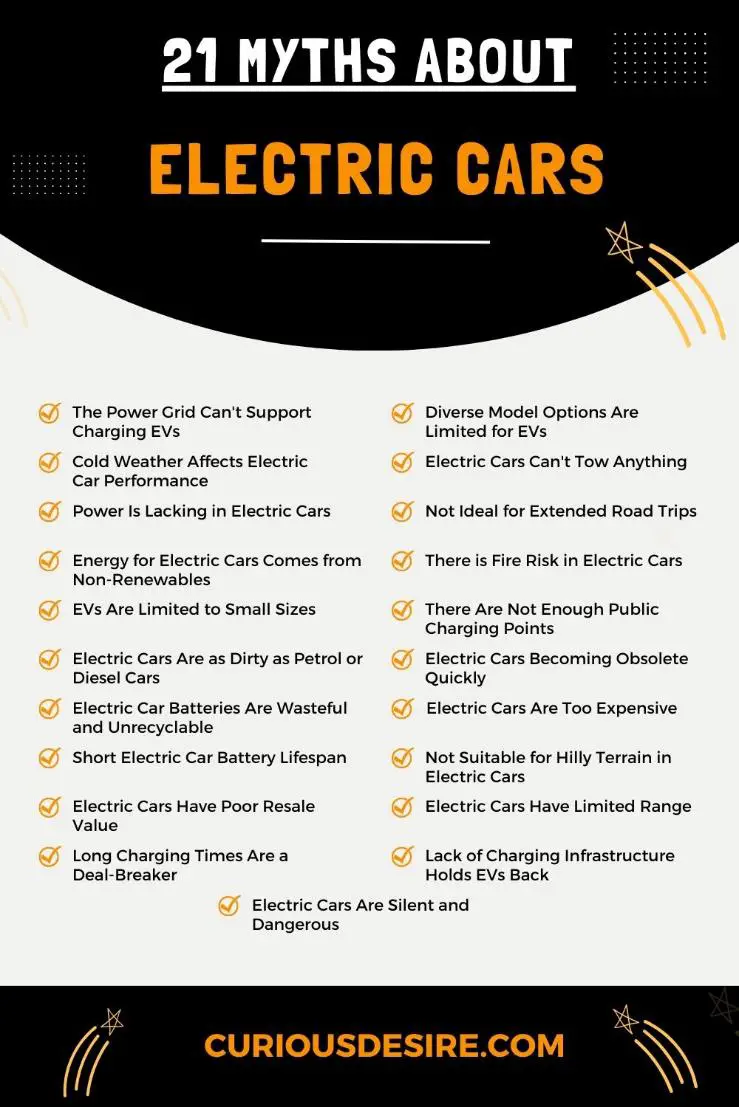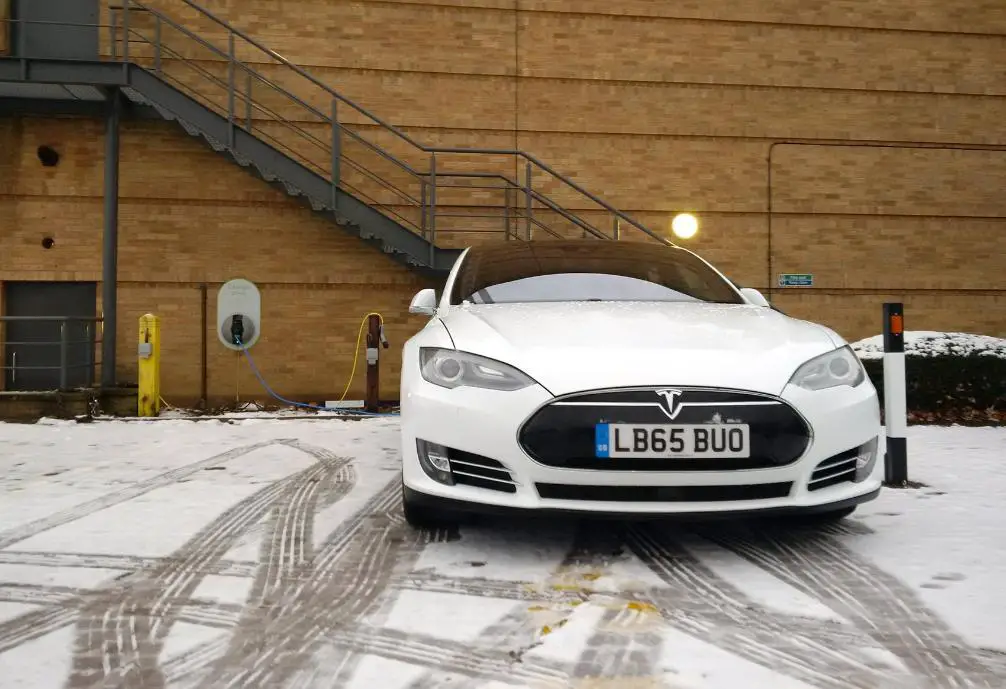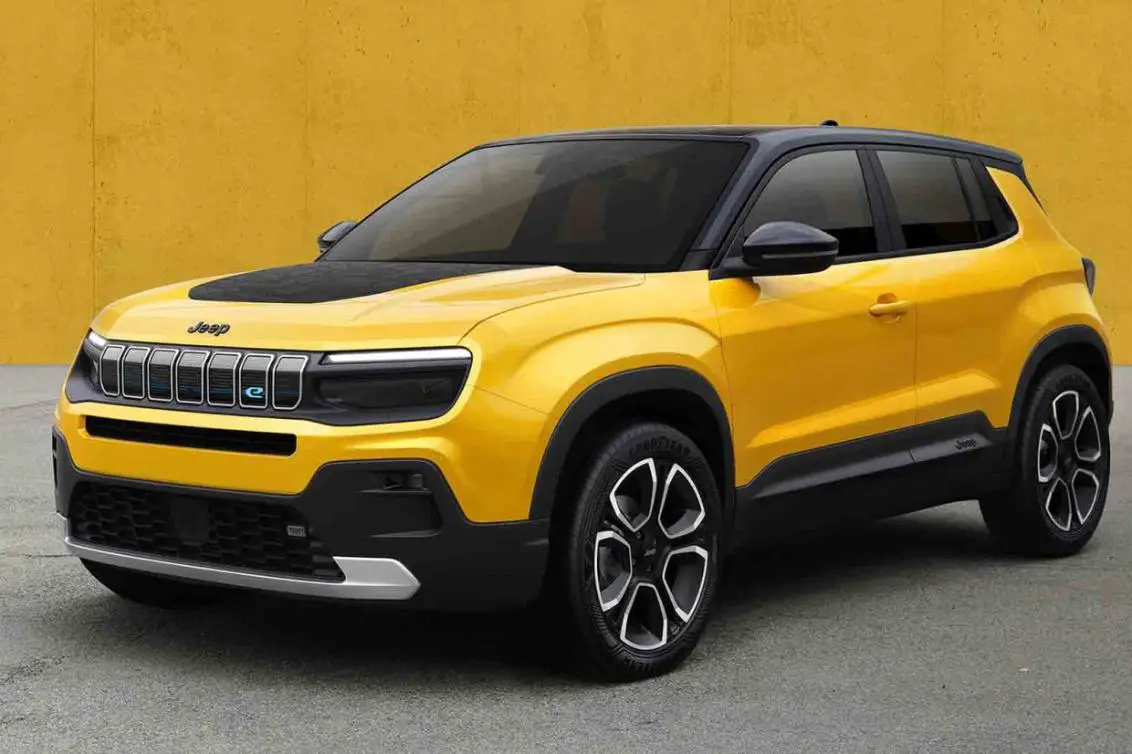In the automotive industry’s shift towards environmental sustainability, electric cars are at the forefront, leading the green revolution.
Despite promising a cleaner ride, these vehicles face their fair share of myths.
In this article, we aim to bust common misconceptions about electric cars, revealing the truth behind the wheel of innovation.
5 Most Common Myths About Electric Cars Are as Below:
- Power Is Lacking in Electric Cars
- Not Ideal for Extended Road Trips
- Fire Risk in Electric Cars
- Not Enough Public Charging Points
- Electric Cars Are Silent and Dangerous
[toc]

Myth 1: The Power Grid Can’t Support Charging Electric Cars
Why the Myth Exists:
Some people worry that if everyone starts driving electric cars, the power grid we currently have might not handle the extra demand.
There’s a fear that if lots of people plug in their electric cars at the same time, it could be too much for the grid, leading to power shortages or blackouts.
Debunking the Myth:
Thanks to better technology, using energy more efficiently, and using more renewable energy sources, our power grid can handle more electric cars than you might think.
Notably, peak-time electrical demand has decreased over the years.
So, even if everyone switched to electric cars, it wouldn’t put too much stress on our power system.
Planning for this change also means we can make the right adjustments to our infrastructure as we go along.
Myth 2: Diverse Model Options Are Limited for Electric Cars
Why the Myth Exists:
The perception that electric car options are limited arises from historical views of electric vehicles as niche and primarily focused on smaller, urban-centric models.
This made people believe there weren’t many choices when compared to traditional cars.
Debunking the Myth:
The electric car market has undergone a transformative shift.
More and more carmakers are realizing that people want electric options, so now there are a bunch of different models in various sizes and types.
Even though the idea of limited choices stuck around, the reality is that the electric car market is growing fast, giving consumers a wide range of options.
Myth 3: Cold Weather Affects Electric Car Performance
Why the Myth Exists:
Concerns about cold weather impacting electric cars stem from early misconceptions about how batteries respond to temperature extremes.
In colder climates, there were worries that batteries might experience reduced efficiency, affecting overall performance.
Debunking the Myth:
Although extreme weather can impact how efficient a battery is, modern electric cars are smart.
They have fancy systems to control the battery temperature, so even in the cold, they work just fine.
As technology gets better, electric cars keep improving their performance in all kinds of weather, proving that the old idea of them struggling in the cold isn’t accurate anymore.
Myth 4: Electric Cars Can’t Tow Anything
Why the Myth Exists:
In the past, some folks believed that electric cars couldn’t tow things.
This was because the early electric cars didn’t really talk much about their ability to tow stuff, unlike regular cars that have strong engines.
Debunking the Myth:
The idea that electric cars can’t tow comes from old ways of thinking. Many electric SUVs and trucks have actually shown they can tow really well.
Electric motors, which can push out a lot of force, make electric vehicles great for pulling trailers and handling different towing jobs.
As more electric cars come out, we’re seeing them do great at towing in real-life situations, proving this idea wrong.
Myth 5: Lacking Power in Electric Cars
Why the Myth Exists:
Skepticism about the power of electric cars may arise from early models that were perceived as less powerful compared to some high-performance combustion engine vehicles.
Traditional beliefs about engine roar and high horsepower contribute to doubts about the power of electric cars.
Debunking the Myth:
Contrary to popular belief, electric cars boast instant torque delivery, providing impressive acceleration.
The absence of a traditional engine roar may lead some to underestimate their power, but the performance of many electric models surpasses their combustion counterparts.
The myth that electric cars can’t perform well is slowly fading away as more high-performance electric cars hit the market.
Myth 6: Not Ideal for Extended Road Trips
Why the Myth Exists:
Early concerns about charging infrastructure and limited range led to the belief that electric cars were suitable only for short city trips.
The skepticism about using electric cars for long journeys came from the idea that it would be inconvenient to charge them while on the road.
Debunking the Myth:
The view that electric cars are only suitable for short trips is still around because of old ways of thinking.
However, the reality is that the charging infrastructure for electric cars has grown a lot.
Better battery technology means electric cars can now go longer distances, making them a good option for longer road trips.
Also, more fast-charging stations are popping up, showing that electric cars are becoming more practical for journeys.
Myth 7: Energy for Electric Cars Comes from Non-Renewables
Why the Myth Exists:
Some assume that electric cars derive their energy solely from non-renewable sources, negating their environmental benefits.
The belief may arise from differences in the energy mix used for generating electricity in different regions.
Debunking the Myth:
The idea that electric cars aren’t eco-friendly persists because, in some places, the electricity for these cars comes from non-renewable sources. However, this overlooks the bigger picture.
Many areas use a combination of renewable and non-renewable energy sources.
As we move towards cleaner energy, electric cars become more environmentally friendly.
The myth sticks around because not everyone knows about the evolving energy landscape and the growing use of renewable sources for making electricity.
Myth 8: There is Fire Risk in Electric Cars
Why the Myth Exists:
Concerns about fire risks in electric cars may be rooted in early incidents that received significant media attention.
The complex electrical systems in electric vehicles may contribute to fears about potential safety hazards.
Debunking the Myth:
Electric cars go through strict safety testing, and their risk of catching fire is similar to that of traditional vehicles.
Safety measures, like thermal management systems and fire-resistant materials, are crucial parts of electric car designs.
Myth 9: Electric Cars Are Limited to Small Sizes
Why the Myth Exists:
Individuals often link electric cars with smaller, compact models.
This notion comes from the fact that the first electric vehicles were mainly designed for city commuting, leading to the belief that electric cars are only suitable for smaller sizes.
Debunking the Myth:
The myth is a product of outdated perspectives as the electric vehicle market evolves.
As the electric vehicle market grows, we’re seeing bigger electric SUVs and trucks, breaking the misconception that electric cars are limited to smaller sizes.
Car manufacturers understand that people want electric vehicles in a diversification of sizes, and boot space, so they’re making a variety of options, including larger ones with more space.
Myth 10: There Are Not Enough Public Charging Points
Why the Myth Exists:
People driving traditional petrol cars might not actively seek or be aware of electric charging points, leading to the misconception that there is a scarcity of public charging infrastructure.
Debunking the Myth:
The truth is, there are a lot more places to charge electric cars now. In some areas, there are even more charging points than places to get petrol.
Lots of people who have electric cars charge them at home, especially at night, which is super convenient.
If more people knew about these charging spots, it would help if there were better signs and awareness campaigns.
Myth 11: Electric Cars Are as Dirty as Petrol or Diesel Cars
Why the Myth Exists:
This myth often arises from a narrow focus on tailpipe emissions, neglecting the broader environmental impact of traditional vehicles throughout their lifecycle, including extraction, refining, and transportation of fossil fuels.
Debunking the Myth:
To accurately assess the environmental impact, it’s important to consider “well-to-wheel” emissions. Electric cars have a considerably lower carbon footprint compared to traditional vehicles.
As the global energy landscape shifts towards renewable sources, the overall emissions associated with electric cars will continue to decline, making them a cleaner alternative in the long run.
Myth 12: Rapid Obsolescence of Electric Cars
Why the Myth Exists:
The rapid pace of technological advancements in the electric vehicle industry may create concerns, new models will make the current electric cars outdated soon.
Debunking the Myth:
Continuous advancements in electric vehicle technology are designed to be backward-compatible, ensuring that older models stay relevant.
Manufacturers provide software updates, enabling older electric cars to enjoy new features and improvements, enhancing their longevity.
The industry’s dedication to backward compatibility dismisses concerns about electric cars quickly becoming obsolete.
Myth 13: Wasteful and Unrecyclable Batteries in Electric Cars
Doubts about electric car batteries come from worries about the environmental impact of their production and disposal.
There’s a mistaken belief that these batteries contribute significantly to electronic waste (e-waste).
Debunking the Myth:
Electric car batteries are recyclable, and ongoing research is focused on improving the sustainability of battery production.
Once retired, batteries can find second lives in various applications, such as energy storage for renewable sources.
Efforts toward a circular economy aim to minimize waste, making electric car batteries part of a more environmentally friendly and sustainable ecosystem.
Myth 14: Electric Cars Are Too Expensive
Why the Myth Exists:
Seeing electric cars as cutting-edge tech leads to the misconception that such advancements must be pricey.
The notion that these vehicles are not cheap but rather expensive comes from linking innovation with a hefty cost.
Debunking the Myth:
While the initial purchase price may be higher, the total cost of ownership for electric cars is often lower due to reduced fuel and maintenance expenses.
As technology advances and economies of scale come into play, the upfront cost is gradually decreasing.
Moreover, there are various incentives and subsidies designed to make electric cars more accessible.
This highlights the long-term economic advantages of choosing electric vehicles over conventional ones.
Myths About Electric Cars – FAQs
What are the negative effects of electric cars?
- Battery Production Impact: The manufacturing of electric car batteries involves the extraction of rare earth metals, contributing to environmental consequences.
- Energy Source Dependence: If the electricity used to charge electric cars comes from non-renewable sources, it can contribute to environmental pollution.
- Limited Range and Charging Infrastructure: Despite improvements, the range of electric cars and the availability of charging stations can still be limited in certain regions.
What was the problem with electric cars?
Historically, electric cars faced challenges such as limited range, high upfront costs, and a lack of charging infrastructure. However, advancements in technology have addressed many of these issues.
Can electric cars be trusted?
Electric cars are generally reliable and trustworthy. They undergo rigorous safety testing, and their performance has been proven over the years.
As with any technology, regular maintenance and adherence to safety guidelines are essential.
How do electric cars affect the environment?
Electric cars can have a positive environmental impact by producing fewer greenhouse gas emissions during operation compared to traditional vehicles.
However, the environmental impact also depends on factors like the energy source used for electricity and the manufacturing process of batteries.
How long do electric cars last?
The lifespan of electric cars varies, but with proper maintenance, they can last for several hundred thousand miles. Battery longevity is a key factor, and advancements in battery technology continue to improve durability.
What is the advantage and disadvantage of electric cars?
- Advantages: Reduced greenhouse gas emissions, lower operating costs, quieter operation, and government incentives.
- Disadvantages: Limited driving range (although improving), initial cost, and dependency on charging infrastructure.
Do electric cars overheat?
Electric cars can overheat, just like traditional vehicles. However, they are equipped with cooling systems to manage temperature, and built-in safeguards help prevent overheating.
Do electric cars have brakes?
Yes, electric cars have brakes. They typically use regenerative braking, which converts kinetic energy back into stored energy in the battery, improving overall efficiency.
Do electric cars have gears?
Most electric cars operate with a single-speed transmission, eliminating the need for traditional multi-speed gearboxes. This simplicity contributes to a smoother driving experience.
Do electric cars have RPM?
Electric cars do have a measure of rotational speed, similar to RPM (Revolutions Per Minute). However, electric motors operate over a broader range of RPM compared to traditional internal combustion engines.
Do electric cars have a clutch?
Electric cars usually don’t have a traditional clutch, as they use a single-speed transmission. The torque delivery in electric cars is instantaneous and doesn’t require a clutch for gear shifting.
Do electric cars have accelerators?
Yes, electric cars have accelerators, also known as pedals for controlling speed. They use an accelerator to increase or decrease the speed of the electric motor.
What are the advantages of electric cars?
Advantages of electric cars include reduced greenhouse gas emissions, lower operating costs (electricity is often cheaper than gasoline), quieter operation, and potential government incentives.
What are electric cars’ three advantages?
Three key advantages of electric cars are environmental friendliness (lower emissions), lower operating costs, and the potential for energy independence by using renewable energy sources.
What are the advantages of electricity?
The advantages of electric vehicles include lower environmental impact, reduced dependence on fossil fuels, and potential long-term cost savings due to lower maintenance and fuel costs.
What are the advantages of electric cars?
Advantages of electric cars over traditional vehicles include lower greenhouse gas emissions, lower operating costs, quieter operation, and the potential for renewable energy use, contributing to a cleaner and more sustainable transportation system.

